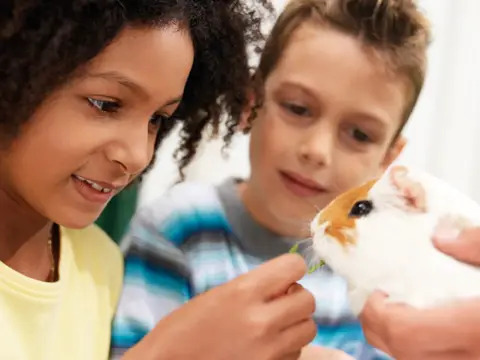Thinking about getting a small pet like a hamster, gerbil, or guinea pig for your kids? Here are 5 tips from the experts at PetSmart on how to choose the right pet, including advice on these small pets’ habits, diets, and exercise needs.
 Small animals, such as guinea pigs, hamsters, gerbils, and chinchillas, make great first pets for kids and can teach children responsibility. But before adding one to the family, it’s important to make sure you are bringing home the right pet for your family.
Small animals, such as guinea pigs, hamsters, gerbils, and chinchillas, make great first pets for kids and can teach children responsibility. But before adding one to the family, it’s important to make sure you are bringing home the right pet for your family.
“Small pets are great, playful new pals. And the best way for families to choose a pet and make them part of your home is to consider how the pet is going to fit into your lives,” says Kemba Marshall, DVM, veterinarian and pet care expert at PetSmart. “Families should first learn about each pet’s unique characteristics to prepare for a change in their daily habits and responsibilities in caring for their new pet.”
Online resources, including PetSmart’s Small Pet Center, have tips on how to choose a small pet, whether it’s a chinchilla, gerbil, or hamster, based on children’s ages, pet-care experience, and daily time requirements for care.
Take some time to learn how to best care for your small pet before you bring it home. Make sure you:
Choose the right habitat: Small pet habitats have varying requirements, and there are must-have supplies and accessories to keep your pet happy and healthy. For example, guinea pigs are easy to tame, affectionate, and expressive, and they need plenty of floor space to play. Hamsters, which are known for being playful and active, need a multilevel habitat large enough to include an exercise wheel and tunnels.
Nominate your pet’s care takers: Match your child’s maturity to the pet they will care for. For instance, gerbils are great beginner pets because they are gentle, social, and enjoy the companionship of another gerbil. Or, your child may prefer a chinchilla as they have perky personalities and will bond with their pet parent through regular, gentle handling.
Understand the pet’s habits: Some small pets are nocturnal and are most likely to be active at night – which means you might not get as much daytime play time as you like. Ask about special care needs for your small pet, too. Chinchillas, which are known for their especially soft fur, need dust baths to clean themselves, and Syrian hamsters require grooming products like brushes and wipes help them look and smell good.
Provide proper nutrition: Each animal has its own nutritional needs. Guinea pigs and chinchillas are herbivores so they need diets that include at least 75 percent high-fiber hay. Guinea pigs also need vitamin C supplements. Many rodents’ teeth never stop growing, so providing wood chews or edible houses offers not only a yummy surprise but also helps keep teeth trimmed.
Talk to experts: Take a family trip to a store such as PetSmart, where associates can help with pet selection and walk you through the basics of habitat cleaning, feeding schedules, and how to properly and safely handle small pets. Each store’s book section also carries pet health manuals and pet-specific handbooks.
Article courtesy of PetSmart.
Also see:
What to Know Before You Adopt a Pet
How to Choose the Best Breed of Dog or Cat for Your Family















